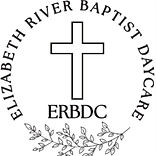
ELIZABETH RIVER BAPTIST DAYCARE
Explore. Play. Learn. Grow in Christian Faith.
WELCOME
A place where we teach differently, through a unique blend of the arts and inquiry, sensory experiences, nature exploration, and purposeful play.

We are a ministry of Elizabeth River Baptist Church which is a non-profit, religious exempt facility regulated through the Virginia Department of Education located in Chesapeake, VA. We welcome children 6 weeks to pre-Kindergarten with Before and After school available. Through our experienced early childhood educators and administration, we aim to meet each child's optimal development in a small group setting.
We offer a mix of traditional Christian learning and a multi-sensory curriculum of learning. All complemented with engaging activities that promote your child's growth and development. Every staff member at Elizabeth River Baptist Daycare is committed to supporting your family in raising happy, healthy, confident and spiritually fed children even after they depart Elizabeth River Baptist Daycare.
We are a privately owned, non-profit child care center committed to nurturing and educating your children in a safe and loving environment. Our Center provides cozy amenities:
Small Classroom Sizes
Natural Outdoor Classroom/Playscape
Warm & Inviting Environments
Loose Parts Play
Holistic Strategies
Faith Based Programs
Out of School Camp
One of the most important decisions you'll make is who to trust your children with for their care. Schedule a tour today and see if Elizabeth River Baptist Daycare offers that feeling of security and education opportunities your family desires.
Are you interested in learning more about ERBDC? Call us today for more information and to schedule your tour. We are happy to answer any questions or concerns your may have about our Center.

ABOUT OUR MINISTRY
Our Center is one of the organizations within Elizabeth River Baptist Church. The purpose of the Daycare Ministry of the church is to minister families with quality Christian Education and childcare. The Daycare committee of ERBDC is comprised of active members of the church which implement policy and Center business, while the daily operation of the Center is executed by the Center Director.
OUR MISSION
Elizabeth River Baptist Daycare focuses on the individuality and uniqueness of each child. We aim to serve a proudly diverse group of families and their children.Our mission is to create a safe and inspiring environment that allows each child to develop at his/her own pace and provide experiences that encourage self-confidence, connection, curiosity, and a love of learning.


OUR PHILOSOPHY
A FAITH BASED INSPIRED LEARNING
Elizabeth River Baptist Daycare has long followed a child-centric philosophy in its approach to early childhood education. This philosophy encompasses a play-based curriculum and the belief that a child's school environment should be one of unqualified love, warmth, acceptance and respect.



